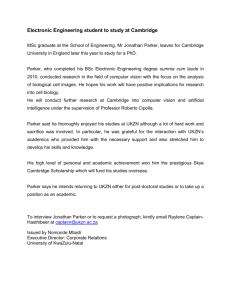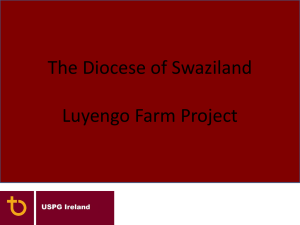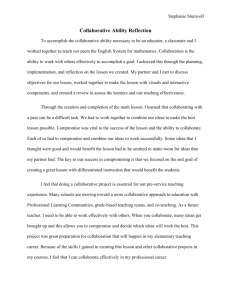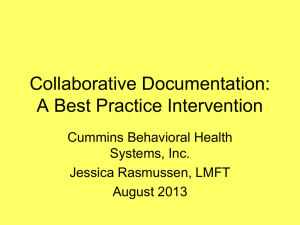A Case Study of Regional Strategic Alliances Toward
advertisement
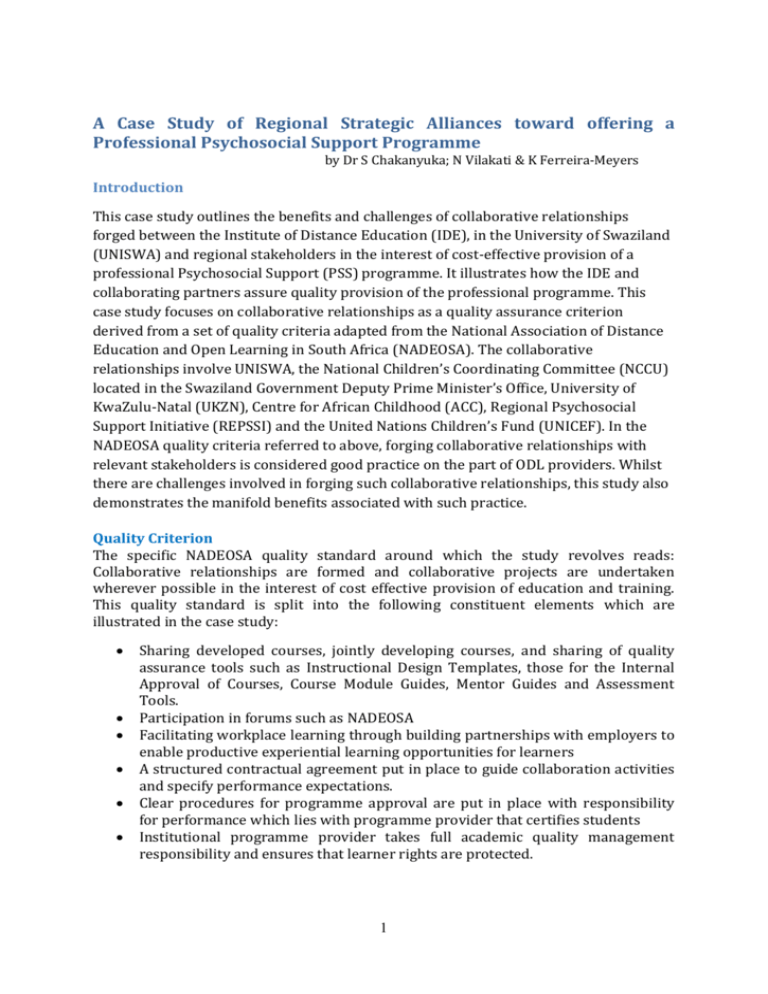
A Case Study of Regional Strategic Alliances toward offering a Professional Psychosocial Support Programme by Dr S Chakanyuka; N Vilakati & K Ferreira-Meyers Introduction This case study outlines the benefits and challenges of collaborative relationships forged between the Institute of Distance Education (IDE), in the University of Swaziland (UNISWA) and regional stakeholders in the interest of cost-effective provision of a professional Psychosocial Support (PSS) programme. It illustrates how the IDE and collaborating partners assure quality provision of the professional programme. This case study focuses on collaborative relationships as a quality assurance criterion derived from a set of quality criteria adapted from the National Association of Distance Education and Open Learning in South Africa (NADEOSA). The collaborative relationships involve UNISWA, the National Children’s Coordinating Committee (NCCU) located in the Swaziland Government Deputy Prime Minister’s Office, University of KwaZulu-Natal (UKZN), Centre for African Childhood (ACC), Regional Psychosocial Support Initiative (REPSSI) and the United Nations Children’s Fund (UNICEF). In the NADEOSA quality criteria referred to above, forging collaborative relationships with relevant stakeholders is considered good practice on the part of ODL providers. Whilst there are challenges involved in forging such collaborative relationships, this study also demonstrates the manifold benefits associated with such practice. Quality Criterion The specific NADEOSA quality standard around which the study revolves reads: Collaborative relationships are formed and collaborative projects are undertaken wherever possible in the interest of cost effective provision of education and training. This quality standard is split into the following constituent elements which are illustrated in the case study: Sharing developed courses, jointly developing courses, and sharing of quality assurance tools such as Instructional Design Templates, those for the Internal Approval of Courses, Course Module Guides, Mentor Guides and Assessment Tools. Participation in forums such as NADEOSA Facilitating workplace learning through building partnerships with employers to enable productive experiential learning opportunities for learners A structured contractual agreement put in place to guide collaboration activities and specify performance expectations. Clear procedures for programme approval are put in place with responsibility for performance which lies with programme provider that certifies students Institutional programme provider takes full academic quality management responsibility and ensures that learner rights are protected. 1 Background of Collaborating Partners Regional Partners The partnership was formed at regional level in 2004, whereupon the Regional Psychosocial Support Initiative (REPSSI) initiated discussions with UNICEF around lack of university accredited Open and Distance Learning (ODL) courses for communitybased personnel working specifically with children affected by HIV/AIDS in the region. Although there was an abundance of workshops, seminars and organizational level training courses around supporting vulnerable children, they noted that there was not a single accredited university-based ODL course in existence. REPSSI also noted that the rights and needs of the caregivers were not adequately addressed in the current training programmes being mounted by different organisations. To address this problem, the ACC was created in partnership with the UKZN. The primary objectives of the ACC are: To develop, write and disseminate new academic courseware at certificate and degree levels for the Children and HIV/AIDS fields. To coordinate and encourage trans-institutional cooperation amongst African Universities in the region around capacity building for the delivery of newly developed courseware. To provide impetus, technical assistance and coordination to Universities in East and Southern Africa towards the cooperative pursuit of an African Research Agenda for the Children and HIV/AIDS fields. ACC proposed a two-stage plan for implementing this capacity building programme. The programme is designed to educate candidates who are working with children either at individual or stakeholder level up to a certificate level of qualification. The first stage was to develop and pilot the ODL materials and as part of a UKZN accredited certificate programme. The second stage was directed at the second objective of building sustainable capacity in the region by encouraging national educational institutions to take ownership of the ODL programme as part of a localisation initiative. For the localised programme activities to be sustainable, the local institutions would be expected to adapt the content to meet the specific needs of their students within a regional setting, as well as to take over the accreditation of the certificate programme. Then the ACC will continue with its supportive role during the transitional process and encourage further future collaboration (in line with Objective 3). Local Institution At the local level, IDE was co-opted to become the UNISWA institutional programme provider for the PSS. IDE was established by UNISWA in 1994 specifically to provide educational and training opportunities for individuals who had been unable to undertake conventional and professional university programmes and courses. The mission of the IDE is to increase access to tertiary education by providing demanddriven educational and training opportunities to individuals (employed, self-employed, unemployed and school leavers) by offering them quality short and long term credit and 2 non-credit courses using the distance education delivery mode. The PSS programme was therefore well aligned with the institution’s mission. Starting from the first professional programme that the IDE offered, that is the Diploma in Law, the Institute has continued to add new programmes and courses. Currently, the Institute offers ten programmes. These are outlined in Table 1 as follows: Table 1: IDE Programmes Programme Offered by IDE Degree programmes (August in-take) Bachelor of Arts (Humanities); Bachelor of Commerce; Bachelor of Education (Adult Education); Bachelor of Education (Primary Education); and Bachelor of Education (Secondary Education) Diploma programmes (August in-take) Diploma in Commerce; Diploma in Law; Certificate programmes (August in-take) Certificate in French Certificate in Portuguese; Post Graduate Certificate in Education Concomitant with the increase in programmes, there has been a great increase in the enrolment of students in the IDE. Table 2 shows the IDE enrolments from inception to 2010. Table 2: Students enrolment per programme in IDE from Academic year 1996/97 to Academic year 2009/10 Programme 1996-97 1998-99 2000-01 2002-03 2004-05 2006-07 2009-10 B.A (Humanities) 56 99 290 416 490 675 623 B.Ed (Adult Educ.) - 44 81 79 65 51 49 36 106 179 314 409 474 Diploma Commerce in 24 Diploma in Law 70 102 298 570 691 740 337 Certificate in French - 1 5 2 06 08 8 B.Com. (Started in 2004-05) - - - 29 60 135 Certificate (Portuguese) - - - - - 10 - 3 (Started in 2009-10) B.Ed. (Primary) (Started in 2009-10) - - - - - 53 B.Ed. (Secondary) (Started in 2009-10) - - - - - 54 Total 282 780 1246 1595 1943 1743 150 Source: IDE Records, University of Swaziland, 2010 Organisation of the programme The PSS programme is managed by the ACC which represents the interests of REPSSI, UKZN and UNICEF (East and Southern Africa Regional Office [ESARO]). In Swaziland, there are additional collaborative partners, responsible for coordinating the Certificate programme activities, who interact regularly with the UNISWA. These are the members of the National Children’s Coordinating Committee (NCCU) located in the Deputy Prime Minister’s Office and UNICEF (Swaziland). At UNISWA IDE level, a programme coordinator manages the programme on a daily basis. Six module coordinators are responsible for training mentors and marking assignments. A mentor supervisor monitors the contact sessions, holds regular contact sessions with the mentors and resolves any academic and disciplinary problems mentors have in their groups, in collaboration with the programme coordinator, where necessary. The mentor supervisor visits the groups during contact sessions to monitor progress, offer support to mentors and students, and keep partners informed of the level of work going on in the groups. The mentor supervisor’s coordination and mentor supporting roles are crucial for the successful delivery of the programme in the country. The illustration below shows the organizational structure of the programme. Management Structure for the Certificate Programme, Swaziland ACC (REPSSI, UNICEF(ESARO),UKZN) Programme Coordinator 6 Module coordinators NCCU UNICEF Swaziland Mentor Supervisor 9 Mentors 129 students Note: The programme started with 129 students in June 2010. 4 Collaborative Relationships IDE relies in part on a collaborative relationship for quality assurance through widening its base of expertise not only for learning materials design and development but also for capacity building and research activities. As Swaziland is a small state, UNISWA does not have a large pool of academic staff to be involved in various academic activities. As a result, the success of the PSS programme depends in part on the strong collaboration which exists among the key stakeholders with complementary knowledge and skills. According to Melton (2002) an important quality assurance strategy is to involve various experts to play complementary roles during course design and development. As a result, quality assurance is seen as an on-going part of programme localisation, whereby throughout the process feedback is collected and acted upon to identify and rectify prevailing weaknesses. An additional benefit cited by Koumi (1995) is that the various experts ensure that good quality is built into the process rather than inspecting bad quality afterwards. At national level, expertise is drawn from UNISWA, the NCCU and UNICEF (Swaziland). At regional level, collaborating partners are the UKZN, the ACC, UNICEF (ESARO) and REPSSI. Himmelman (1992) argues that such collaborative relationships are formed to achieve a common purpose. In this case, the purpose was to share experiences, expertise and knowledge in offering the Certificate programme. UKZN was involved from the pilot phase and had gained invaluable expertise in managing the programme. As UNISWA takes over, they learn a lot from UKZN about programme related processes while UNICEF (ESARO) and REPSSI continue effort to source funding to sustain the programme. A structured contractual agreement is in place to guide collaboration activities and specify performance expectations. To ensure effective collaboration among partners, a Memorandum of Understanding was signed between the University of Swaziland and ACC [representing UKZN, REPSSI and UNICEF (ESARO)]. The agreement has provided a broad-based and general platform for collaboration. The next vital tool was the Memorandum of Agreement (MOA) again signed between UNISWA and ACC. The MOA clearly spells out the roles of each partner in the transitional phase. Another MOA spells out the roles of the partners in the last phase, after UNISWA takes over full control of the programme. For example, UKZN will moderate assignments marked at UNISWA to ensure maintenance of the high quality standards set during the pilot phase. UNISWA recruits mentors and jointly with UKZN, up-skills them on their mentoring roles about three times during the 18 months’ period of the programme. Institutional programme provider takes full academic quality management responsibility and ensures that learner rights are protected. The pilot phase of the Open and Distance Learning (ODL) programme ended in December 2009, after which five African countries elected to participate in phase 2, the transitional phase. Swaziland is one of the five countries. The Government of Swaziland, through the NCCU, realized the importance of partnering with UNISWA as a credible 5 institution of higher learning. The UNISWA is also seen to be fit to take over from the UKZN because the ODL programme can be housed in the IDE. Sharing developed courses and jointly developing new courses UNISWA and partners have worked closely not only in training mentors and module coordinators but also in making input during the design phase of new courses currently under development. The teams have shared quality criteria and standards, which, according to Koul (2000: 236), is important to establish an effective and welldocumented quality assurance system relating to academic and administrative functions in distance education. For mutual benefit, Vella (2002) tends to lay more emphasis on sound relationship skills to sustain such collaborative activities. These include but are not limited to mutual mentoring, tone of mutual respect, nonjudgmental dialogue and open questions that invite dialogue. The successful transition of the project from ACC to UNISWA is critical for the long-term sustainability of the programme. During this transitional phase, UNISWA works in partnership with UKZN through the ACC to prepare and familiarise themselves with running the programme in the following years. UKZN materials (e.g. modules and guides) and pedagogical approach will be adopted, while UNISWA will provide overall programme coordination, supervision and support of mentors, and the marking of assignments. The training of mentors and module coordinators will be carried out by UKZN in Swaziland. Some responsibilities (e.g. validating academic content will remain with the ACC, whilst others (e.g. recruitment and certification) will be shared by local Swaziland partners). For example, UKZN, ACC and UNISWA have collaborated through workshops to discuss adult education, experiential and applied learning principles, which, at the inception of the programme, informed the design of the three curriculum components: the learning materials, the mentor led group sessions and the assessment. The collaborative relationship continues during the design and development of new courses and curriculum components. For example, samples of new modules are shared and critically reviewed to enhance the quality of the modules. At the end of the project, UNISWA will be in the position to take local control of the programme and thus its effective and efficient operation within Swaziland. It will also build and sustain relationships with regional and local stakeholders with the aim of not only improving the existing programme, but also extending it to cover other areas of social welfare and different levels of qualifications (diplomas, degrees, etc.). Workplace learning and experiential learning opportunities The modules for this programme were designed in such a way that students have to reflect on their experience to fully understand the theories presented in the modules. At contact sessions, students are encouraged to share their experiences of working with children so that the theories learnt make sense to all of them. Students are also encouraged to practise what they learn in their day to day work with children. Through implementing the lessons learnt, they not only improve their understanding of the learning material but also their work with children- a double benefit. 6 In addition, the design of the Certificate is such that it facilitates workplace learning through partnerships with employers to enable productive experiential learning opportunities for learners. In Swaziland, caregivers who previously worked with little or no training have found the Certificate programme empowering as it imparts skills that they need daily in their dealings with children and communities. The programme has empowered many caregivers who could not advance their education before. The programme has opened an avenue for students to engage in workplace learning. To achieve part of this empowerment, the carers need to understand basic human rights and Child Protection concepts, in a bid to be more responsive to the needs of the children, as their target group. Caregivers also need to understand themselves and their profession to ensure that they develop not only into competent but also confident practitioners. Part of the confidence will come from putting into practice what they have learnt and reflecting on their own performance. The programme also helps caregivers to understand the need for collaboration, community alliances, sharing information, and how to work with and within their communities. In recognition of the above, the Certificate programme consists of the following six modules: Module 1: Personal development Module 2: Human Rights and Child Protection Module 3: Child and Youth Development Module 4: Care and Support of Children at Risk Module 5: Integrated Development in Communities Module 6: Service-Learning Project. These learning materials were designed to help students to learn from their experiences. The theory and in text activities expect students to draw lessons from their experiences, thereby extending their acquisition of knowledge and skills to improve the quality of service to children and communities. Quality management responsibility to enhance learner performance A learner support system that is put in place includes: 1. Learner motivation to participate in communities of practice. 2. Academic support which is built into the course materials. 3. Where appropriate, the development of competence through the use of information and communication technologies which is built into the learning outcomes of the programme. There are opportunities for individual academic support for learners either by telephone or by appointment. 4. Learner access to facilities like libraries, computer laboratories and equipment that is necessary for successful learning. This programme is a supported open and distance learning programme. As soon as they are recruited, students are assigned to mentor groups in their residential areas to cut down on travel costs. Each group has a mentor who guides them through the modules, conducts the face-to-face sessions, helps with assignments and solves any problems connected with the students’ studies. In addition, the mentors create group cohesion and team spirit which ensure that students support each other during their studies. In 7 some groups, ‘family’ relationships have developed among the group members and their mentors. Mentors receive financial support to cover communication costs incurred while supporting students to enable them to regularly use the telephone to catch up with students, follow them up and motivate them to stay on the programme. The students have 20 hours of contact time for each module at the rate of five hours per session. Students have found the group sessions very useful in providing learning support, resolving problems and reducing the effects of studying at a distance. Assessment framework Key assessment quality standards that guide assessment processes and procedures on the SSP programme are that: 1. Information on assessment procedures and criteria is provided to the learners 2. The level of challenge of the assessment is appropriate for the level of the qualification 3. There is a range of formative and summative assessment 4. A broad combination of assessment strategies; for example, there might be selfassessment, peer assessment, tutor assessment and assessment by workplace mentors. 5. Clear and efficient arrangements are in place to ensure that the integrity of the programme processes is not compromised. For this programme, assessment is of three main types. Students write two assignments per module, they participate in class and do a work-based project which they present to the rest of the mentor group (so again it should be noted that collaborative learning is a core aspect of the curriculum design complementing the commitment to collaborative endeavour in the design and implementation of the programme as a whole). For each assignment, rubrics are provided so that students are clear about the assessment criteria and grade allocation. Students are also awarded marks for participating in the contact sessions. This encourages students not only to attend sessions but also to play an active and interactive role during the contact sessions. The assessment strategy for the programme ensures transparency, reliability and commitment to quality learning and teaching. As UNISWA was learning from UKZN, assignments were marked at UNISWA and a sample referred to the ACC for moderation. Such collaborative effort ensures adherence to quality standards which were the hallmark of the pilot phase. In addition, students who fail assignments have an opportunity to improve their performance through supplementary assignments organised three times during the 18month period. On the face of it, students have no reason to drop out or fail to complete the programme. However, a very few do drop out due to compelling reasons mostly loss of employment or change of residence which requires students to travel longer distances to attend mentor group sessions. A few students have dropped out after committing offences such as copying each other’s work. Mentors try to follow up on such students but often to no avail. Collaborative research UNISWA and other partners continue to engage in collaborative research not only to assess and evaluate the impact of the programme but also to engage in learner need analysis to inform the design of new courses. The findings from one research study indicated that all respondents were satisfied overall with the programme. They would 8 all recommend the programme to others as they have seen the impact of it on their daily lives and their professional behaviour. One participant stated that s/he would recommend the programme “because it opens the minds of people making them aware of situations and how to solve problems”. Another spoke of being “transformed into a new person with a new perspective towards vulnerable children”. A third one would recommend the programme “because it is very useful, especially in our country setting, we have OVCs, we should be in a position of understanding their needs”. With regard to receiving the right kind of competencies to care for vulnerable children, one respondent indicated that the programme “helps one to be a better developmental facilitator”. And yet another said: “Now I’m doing everything the right way without hindering anybody’s rights”. It appears that the programme has boosted the participants’ confidence and self-esteem. Another participant observed “Living in a traditionalist country makes one see why more laws are needed and the need [for these laws] to be enforced. This programme shows that children need to be cared [for] as they are the future. The programme has improved my understanding of vulnerable children and youth.” Another respondent indicated that the programme “came at the right time for me. It helps me to know more about psychosocial support and to be a reflective practitioner. I have now somehow altered the way I used to perceive children since I am capacitated with the rightful skills – and not what I think is right. For an experienced person in the field yet without formal PSS (psychosocial support) education it has helped me be aware of my role, the standards and what I can do practically to improve the lives of children.” One participant indicated that the programme was important and should be taken by “anyone who works with children as it equips that person and also covers all/most of the aspects one needs to know when working with children”. The importance of children in communities was encapsulated by what one respondent had to say: “Children are voiceless but now we know that they must participate and have a word in this.” Challenges and Lessons Learned Collaboration has many advantages as seen in this case study. However, there are inevitable challenges that are encountered by collaborating partners. In our case, there were delays in signing the contractual agreements that led to the delays in release of funds for the programme. In addition, when two independent institutions collaborate, there may be a tendency for one institution to dominate which erodes the good will between the partners. One other potential weakness is failure on the part of both or one partner to appreciate the mutual benefits to be derived from cooperating with each other. One partner may feel let down and this tends to negatively affect the collaborative relationship. One underlying concern for UNISWA is the sustainability of the programme once external funding ceases. Conclusions The psychosocial programme has contributed towards human resources development in Swaziland in an area where there is demand for scarce skills that caregivers need to cope with their work with children and youth. Not only has the programme widened access to higher education by admitting students who are traditionally disadvantaged, 9 but also by providing conditions that ensure their successful progression. The programme is more likely to uphold high quality standards through the support offered by collaborating partners with many quality assurance mechanisms. Such mechanisms ensure that the students have good supportive systems to achieve ongoing work-based learning success. For example, partners see to it that students have all the necessary self-study materials along with module guides and mentors for additional learning support. Since good learning resources are a necessary but insufficient learning requirement for most students, group and individual support is also provided. Therefore, the success of the programme has been a result of the collaborative relationship between UNISWA and its partners. Despite challenges that are typical of collaborative relationships, such as differences in approaches and work ethics, the benefits far outweigh the challenges. References Himmelman AT. 1992. Communities working collaboratively for a change. Humphrey Inst. Public Aff., Univ. Minn., Minneapolis. 74 pp. ips.ac.nz/publications/files/0691f66709e.pdf Koul, B.N. (1988). ‘Tutor comments: A distance teaching technique’. In Koul, B.N., Singh, B. and Ansari, M.M. (Eds), Studies in Distance Education, New Delhi: AIU and IGNOU. Koumi J. (1995) Building good quality in, rather than inspecting bad quality out, Chapter 31in Lockwood F (Ed) Open and Distance Learning Today, London: Routledge Melton, R. (2002) Planning and developing open and distance learning: a quality assurance approach. London: RoutledgeFalmer NADEOSA. Designing and Delivering Distance Education: Quality Criteria and Case Studies from South Africa. (Eds.) T Welch and Y. Reed Swaziland. Department of Social Welfare (2008) Government of Swaziland Psychosocial Strategic Plan. Mbabane: Government of Swaziland. UNICEF-ESARO, (May, 2009). i-space-africa. International Social Protection and Care Education: Capacity building the Children and AIDS Field, Concept Note. UNISWA Research Board. (2009). UNISWA Responsiveness to Labour Market Environments in Swaziland: A Survey of Graduates, 2000-2007. UNISWA Student Enrolment Year Book, 2010 Vella, J.K. (2002). Learning to listen, learning to teach. The power of dialogue in educating adults. New York: John Wiley & Sons, Inc. 10

